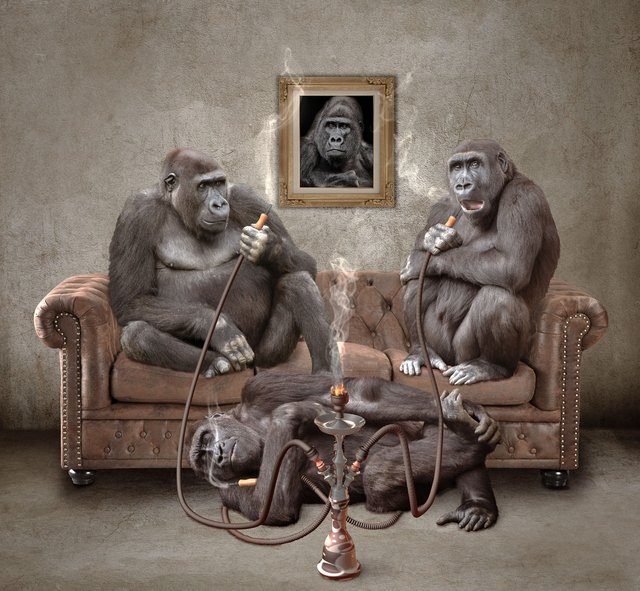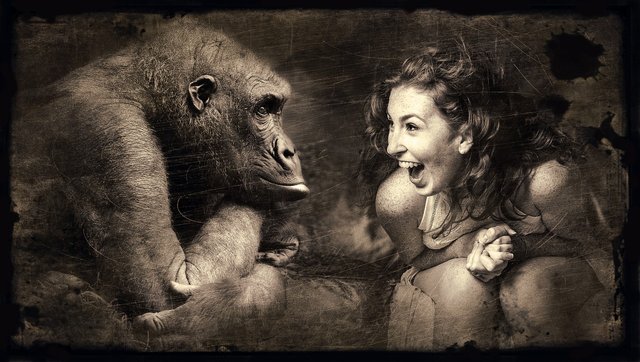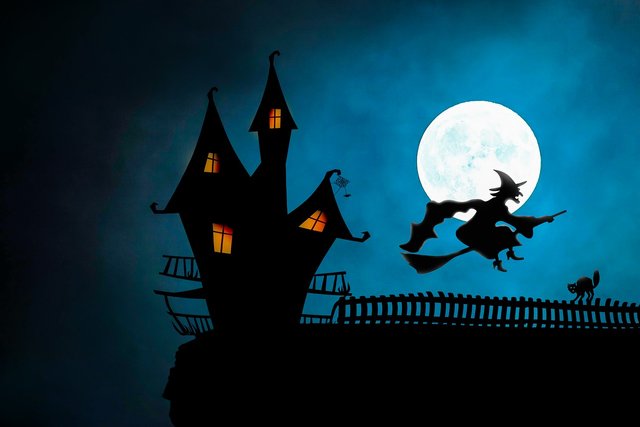KnoWING - Part 7 (ThE ScieNce of FantasY)
Sometimes fantasy goes to power ... at least in our mind. So we can console ourselves and dream with open eyes, but also imagine the future we want. And then put creative solutions into practice.
What do we have in common? “The never-ending story” , the childhood games and the dreams in the eyes of the open? Fantasy. Powerful tool of the mind that projects us into non-existent worlds where everything is possible: fantasy comes from the Greek “phaino” , meaning (show or appear) , a sort of inner cinema. But how does it work? Why is it essential to us? Does it stay in our head or does it affect real life?
MAGICAL THOUGHT 💭
Psychology has been studying it for a century, but it is part of us. And it manifests itself as a child. Daydreams, in fact, are the continuation of a "magical" way of thinking typical of childhood: the child thinks that reality can be influenced by his desires. Imagine being able to fly or move objects at a distance. This is reminiscent of the mentality of primitive men, who thought they controlled nature through rituals such as the rain dance, as well as magical beliefs.
According to the studies of psychologist Marjorie Taylor, professor of psychology at the University of Oregon (USA), more than 60% of children between 3 and 8 years old had an imaginary friend to play with. Taylor reverses a past prejudice against her imaginary companions, as an indication of unease: "They have a healthy role in the cognitive and emotional development of children". Offering, as true friends, companionship, support, protection.
Through play, children create fantasies that allow them to go beyond their limits. They are aware that "pretending to" is not reality but, as long as the game lasts, it is as if it were. Even the adult who fantasizes experiences that sense of omnipotence: it breaks down the barriers between past, present and future and lives the illusion of manipulating reality at will. With the imagination can not match the schedule of the pools, but can imagine what he would do if he became a millionaire.
Our Daily Life
One of the first to discover the power and psychological mechanisms of fantasy was the founder of psychoanalysis, Sigmund Freud. He gave it great importance in mental life: for him, fantasy was the way to express dissatisfied needs that otherwise could not emerge.
Man tends to pleasure, but reality forces him to give it up: so fantasy allows access to worlds in which every desire can be satisfied, escaping from the limits of everyday life. Daydreams console us for what we are not or do not have, mitigate our anxieties, allow us to cancel, at least in our minds, the mistakes of the past.
But imaginative activity is not only a relief ... We need "concretely", because it is also a tool to anticipate the future: when we think about how to furnish the living room, the reaction that our partner will have when he sees a gift, we put in our capacity for imagination.
THE PRINCE CHARMING
According to Ethel S. Person, a psychoanalyst and a professor at Columbia University (USA), fantasy has "a role of great importance in guiding our choices and our relationships". For the psychoanalyst, just think of the fantasy of "Shadow in love": an ideal model of partners, of which we are not aware, with characteristics that derive from the experiences we had since childhood.
Falling in love means making a real person coincide with the shadow lover: perceiving him as the personification, in flesh and blood, of this ancient fantasy. Or find at least some "ideal" characteristics: a girl could, for example, recognize in the partner the image of the "handsome and damned" that has always animated her most intimate dreams.
Everyone Does It
In essence, imagination is an instrument of adaptation: without it we could not conceive alternatives to the present, prefigure future scenarios, or review the past, reworking it in a creative way to serve it in the present and in the future. For example, we could not rethink the misadventures of a camping holiday and take into account our mistakes, fantasizing about the next trip (we will mount the shade tent and bring a more comfortable mattress!).
The Dark Room
The fantasies are then a "private theater", in which the author is at the same time one of the actors (usually the protagonist) and the spectator: no other public is allowed ... The fantasy is in fact jealously guarded : we are willing, more often, to tell our dreams at night than those with open eyes. It may be out of modesty, out of shame, for the doubt that it can not be understood. But often it is also the fear of losing the power of fantasy. In other words, we are afraid that, once told to others, fantasy can fade without giving us more pleasure or alleviating our tensions. At other times, we prefer to live it secretly to avoid confrontation with reality: the perplexed face of a friend who makes us understand that our dream is unrealizable.
Everybody has his/her fantasies. But many are quite common. First of all the erotic ones, which often serve to satisfy desires that would remain dissatisfied in reality. But they are not the only ones. The fantasies of success, of wealth, of power, but also of living extraordinary life are very frequent. The crowds of people who try their luck with games and lotteries are a demonstration of the attempt to give substance to these fantasies.
In fact, fantasies are fed by universal tendencies and emotions (aggression, sexuality, love, hate, hope, fear) and can derive from critical passages of child development.
UNBEATABLE WISHES
Often the fantasies express aspects of the personality that do not reconcile with the image that one has of oneself: inconfessable sexual desires, but also rancor, traumas and fears. They emerge in fantasies in "disguised" form, so that the person can express them without realizing it. A woman who imagines herself as a "man-eating" might actually hide the fear of not being truly loved and accepted.
As Ethel S. Person states,
"fantasy is a game of prestige that the person does without understanding how: it acts to ensure that a part of us does not understand what another party wants".
Moreover, night dreams work like that: they are manifestations of unconscious disguised desires, like sometimes fantasies. But there is a fundamental difference: in dreams there is a total upheaval of logical links (timed out-of-date sequences, inconsistencies); daydreams, on the other hand, are produced with a conscious mind and, therefore, are closer to reality. With imagination we can imagine ourselves in the dunes of the Sahara and then return to the present to think about what to do for dinner, but we realize that we are wandering in different dimensions of time and space.
SOUNDS, IMAGES, WORDS ...
Our "private life" can have a long and articulated plot, but sometimes they take the form of lightning patterns: for example, you can imagine for a moment to get stuck in the elevator. Moreover, the fantasies can manifest themselves with different sensory modalities (sounds, images, tactile sensations, olfactory ...).
In this, there are many differences from person to person. Some feel in their head music which as never abandons them while some (Painters) have a great ability to create visual images.
This capacity can take on truly extraordinary dimensions. Sometimes, however, the verbal component is prevalent: fantasies can take the form of internal dialogues.
But why these differences? It depends on the qualities and sensitivities that everyone has developed most during their growth. These qualities become an important filter for understanding and memorizing reality.
DELIRIUM AND CREATIVITY
A journey through fantasy, as Peter Pan or The Never- Ending Story, is a panacea for the mood. But if used as a systematic escape from reality it can become an addictive mental drug, making it able to tackle some emotional problems. Up to the inability to distinguish between what is real and what is not.
The difference between normal imaginative activity and mental disorder is the difference between impersonating a medieval knight in a role-playing game and believing that he is Lancelot: fantasy takes the place of reality. Those who leave their imagination loose, but those who manage to control it, is instead the creative. It is not overwhelmed by fantasy: it allows space, but at the same time puts it at the service of reality to conceive original and innovative solutions.
TO BE CONTINUED!!!!
Big Thanks to @syndicates for this cool Badge









Hi, very nice to see your post!Thanks for you share!
so nice post i like it
posting is very amazing and very nice I like your posts my friends will always follow you friend
You got a 4.67% upvote from @postpromoter courtesy of @afifa! Want to promote your posts too? Check out the Steem Bot Tracker website for more info. If you would like to support development of @postpromoter and the bot tracker please vote for @yabapmatt for witness!
Interesting article, A+! This reminds me of Yuval Noah Harari's book, "Sapiens." He writes about how money works because we all believe in an idea that isn't tangible.
The very concept of Steem is based on fantasy. If none of us believed in Steem and the future of Steem, it wouldn't be here.
I dreamed about steemit 2 nights ago. I suppose that wasn't to bad of a thing to dream about anyway.
I'm always astonished by a forest. It makes me realise that the fantasy of nature is much larger than my own fantasy.I think i still have things to learn. @afifa
Congratulations! This post has been upvoted from the communal account, @minnowsupport, by afifa from the Minnow Support Project. It's a witness project run by aggroed, ausbitbank, teamsteem, theprophet0, someguy123, neoxian, followbtcnews, and netuoso. The goal is to help Steemit grow by supporting Minnows. Please find us at the Peace, Abundance, and Liberty Network (PALnet) Discord Channel. It's a completely public and open space to all members of the Steemit community who voluntarily choose to be there.
If you would like to delegate to the Minnow Support Project you can do so by clicking on the following links: 50SP, 100SP, 250SP, 500SP, 1000SP, 5000SP.
Be sure to leave at least 50SP undelegated on your account.
That story runs deep into thoughts of the day my kids realized there was no Santa. I was a single parent, they often say single parents will over compensate, I fell into that category. My kids led a very sheltered and protected life. When my first son reached the middle school level so did his reality. When he got home one day with his brother from school they informed me in a this isn't even open for debate manner that there isn't any Santa Claus and demanded to know why I told them all those years there was. I told them it was what was in your hearts and imagination. If you let Santa live there then he is real. That Christmas they were surprised there wasn't as many presents under the tree. I told them when you let something in your imagination die then it cannot exist, if it does not exist then it cannot be part of who you are. To have a open mind can be a rewarding experience.